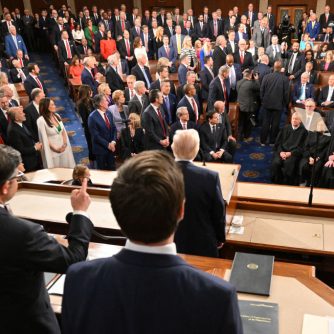On a recent episode of Carolina Newsmakers, Don Curtis sat down with Gregory Griggs, Executive Vice President and CEO of the North Carolina Academy of Family Physicians, to discuss the critical role family physicians play in North Carolina’s healthcare system, the challenges they face, and how the state is adapting to its growing healthcare needs.
The Backbone of Healthcare: Family Physicians
Family physicians are often the first point of contact for healthcare in North Carolina. With their extensive knowledge of all organ systems and ability to treat patients of all ages, family physicians are the most versatile healthcare providers, often referred to as the “quarterbacks” of the healthcare system. They guide patients through various stages of life, from newborn care to end-of-life decisions. Griggs emphasized that family physicians not only treat acute illnesses but also play a crucial role in managing long-term conditions such as diabetes and hypertension. This long-term relationship is essential for providing personalized, continuous care.
The North Carolina Academy of Family Physicians represents over 4,200 members, including practicing family doctors, medical students, and residents. North Carolina trains its future physicians at its 20 family medicine residency programs and soon-to-be six medical schools, ensuring that the state remains at the forefront of healthcare education. Griggs highlighted the importance of training the next generation of family doctors and maintaining a strong workforce, particularly in underserved areas.
The Changing Healthcare Landscape
Griggs noted that North Carolina’s population is growing and aging, leading to a greater demand for healthcare services. While the state has excellent medical schools, it remains a net importer of physicians due to its rapid growth. Many family physicians in North Carolina work in group practices or large hospital systems such as Duke or UNC Health, but a small percentage still operate in solo practices. However, the complexity of running a medical practice, combined with the burden of administrative paperwork, has made solo practices less common.
Urgent care centers have also risen in popularity, but Griggs pointed out that while these centers provide an important service, they do not replace the comprehensive care family physicians offer. Family physicians build long-term relationships with their patients, which is essential for managing chronic conditions and preventing unnecessary emergency room visits.
Healthcare Costs and Administrative Burdens
One of the biggest challenges family physicians face is the growing administrative burden. Between navigating insurance paperwork, coding visits, and meeting quality metrics, doctors are spending more time on paperwork than with patients. Griggs advocated for simplifying these processes, allowing doctors to focus more on patient care. He also expressed concern over the fee-for-service model, which incentivizes doctors to see more patients in less time, rather than rewarding them for keeping patients healthy.
Griggs praised North Carolina’s Medicaid expansion, which will help reduce emergency room visits by providing more people with access to primary care. However, he cautioned that the state’s Medicaid system, which now has 10 plans instead of one, has added complexity for family physicians. Each plan has different metrics and requirements, adding to the administrative workload.
Mental Health and Family Physicians
Mental health has become a significant part of family medicine, especially in the wake of the COVID-19 pandemic. Before the pandemic, about 25% of patients had behavioral health or substance use issues. That number has since risen to 40-50%. Family physicians often serve as the first line of defense for patients dealing with depression, anxiety, and substance abuse. Griggs emphasized the importance of integrated care, where psychiatrists and other mental health professionals collaborate with family physicians to provide holistic care. This team-based approach helps extend the reach of mental health services, which are often limited in rural areas.
The Importance of Telehealth and Innovations from COVID-19
One positive outcome of the pandemic has been the increased use of telehealth. Family physicians have embraced this technology to provide care to patients who may have difficulty traveling to appointments. Telehealth has become particularly useful for managing chronic conditions like diabetes, allowing doctors to check in with patients without requiring them to come into the office.
Griggs noted that telehealth has essentially become the modern equivalent of the house call, allowing doctors to provide care to patients in their own homes. However, he stressed that telehealth is not a replacement for in-person visits, particularly for more complex cases. Despite its benefits, telehealth does not replace the personal connection that family physicians have with their patients, a relationship built on trust and long-term care.
Addressing the Healthcare Workforce Shortage
As North Carolina’s population grows, the demand for healthcare providers, especially in rural areas, is increasing. Griggs highlighted the importance of early exposure to rural medicine for medical students, as students who train in rural areas are more likely to practice there. The North Carolina Academy of Family Physicians is working to encourage medical students to pursue family medicine and practice in underserved areas.
Medical school debt is a significant barrier for students considering family medicine, as it is one of the lower-paying specialties. The average medical student graduates with over $250,000 in debt, which can rise to $350,000 or more by the time they finish residency. To address this issue, North Carolina has implemented loan repayment and scholarship programs to incentivize doctors to practice in rural areas. The state’s General Assembly recently expanded these programs, making it easier for physicians to reduce their debt if they practice in underserved areas.
Prescription Drug Costs and Primary Care Investment
One of the most frustrating aspects of healthcare for both patients and doctors is the high cost of prescription drugs. Prices can vary dramatically, and insurance companies often require patients to try certain medications before approving more expensive treatments. Griggs emphasized the need for investment in primary care, which can help reduce overall healthcare costs by keeping people healthier and preventing the need for more expensive treatments down the road.
Looking to the Future
As the healthcare landscape continues to evolve, Griggs remains optimistic about the future of family medicine in North Carolina. He believes that increasing investment in primary care, reducing administrative burdens, and integrating mental health services will lead to better outcomes for patients. The North Carolina Academy of Family Physicians is committed to ensuring that the state’s family physicians have the resources and support they need to provide high-quality care to their patients.





